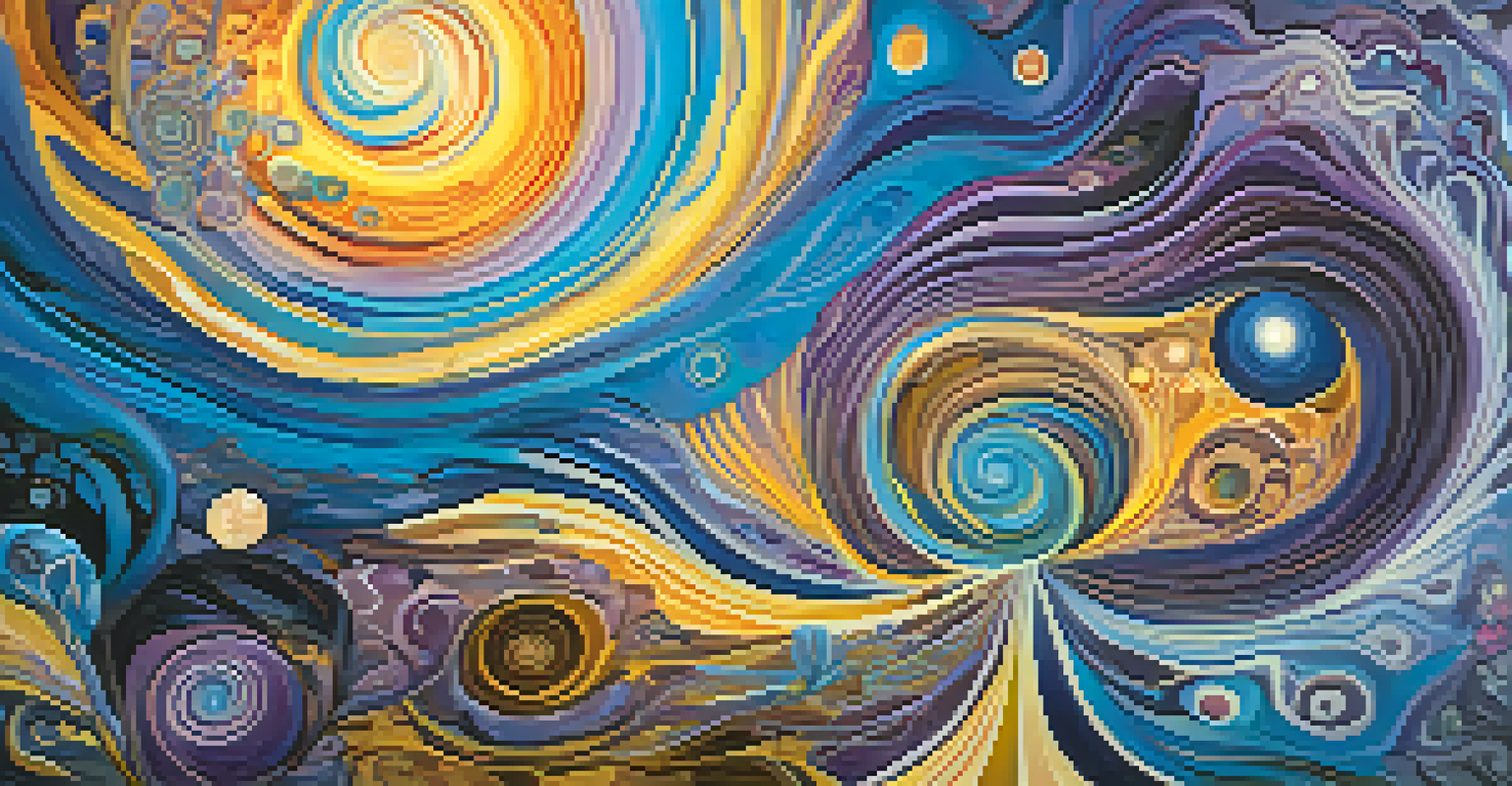Therapeutic Benefits of Entheogens: Evidence and Insights

Understanding Entheogens: A Brief Overview
Entheogens are substances used in spiritual or religious contexts to induce altered states of consciousness. These include natural plants and fungi, such as psilocybin mushrooms and ayahuasca. Many cultures have used entheogens for centuries, believing they can foster a deep connection with oneself and the universe.
Psychedelics can help us understand the nature of consciousness and the human experience.
In modern times, as scientific research expands, there is growing interest in the therapeutic benefits of these substances. Various studies have begun to explore how entheogens can aid in treating mental health issues like depression, anxiety, and PTSD. This resurgence of interest highlights the need to understand both their historical significance and their potential in contemporary therapy.
By distinguishing entheogens from recreational drugs, we can appreciate their unique role in promoting healing and self-discovery. This understanding lays the foundation for examining their therapeutic benefits in subsequent sections.
The Science Behind Entheogens and Mental Health
Research into the therapeutic effects of entheogens shows promising results, particularly in mental health treatment. Studies have indicated that substances like psilocybin can facilitate profound psychological breakthroughs, allowing individuals to confront deep-seated issues. This is often achieved through altered perceptions and emotional release during the experience.

For example, a study at Johns Hopkins University found that psilocybin significantly reduced symptoms of depression and anxiety in cancer patients. Participants reported lasting improvements in their mental health, suggesting that these experiences can lead to positive shifts in perspective. Such findings underscore the potential of entheogens in therapeutic settings.
Entheogens Aid Mental Health Treatment
Research shows that entheogens like psilocybin and MDMA can significantly improve symptoms of depression, anxiety, and PTSD.
However, it's essential to approach this research with caution and respect for the substances involved. The context in which entheogens are used—such as guided therapy sessions—plays a crucial role in ensuring safe and effective outcomes.
Entheogens and Their Role in Treating PTSD
Post-Traumatic Stress Disorder (PTSD) is a condition that affects many individuals, particularly veterans and survivors of trauma. Traditional treatments often focus on talk therapy and medication, but there is emerging evidence that entheogens may offer an alternative approach. For instance, MDMA, often used in conjunction with psychotherapy, has shown significant promise in treating PTSD.
The potential of psychedelics lies not just in their ability to provide a temporary escape from suffering, but rather in their potential to foster lasting transformation and healing.
Research conducted by MAPS (Multidisciplinary Association for Psychedelic Studies) demonstrated that MDMA-assisted therapy led to substantial reductions in PTSD symptoms for participants. Many reported feeling a sense of safety and emotional release during sessions, which allowed them to process traumatic memories more effectively. This therapeutic approach is gaining traction and illustrates the potential of entheogens in healing deep emotional wounds.
The use of entheogens in PTSD therapy highlights the importance of a supportive environment. Professional guidance can help individuals navigate their experiences, providing a safe space for reflection and healing.
Entheogens in the Treatment of Addiction
Addiction is a complex challenge that often requires innovative solutions. Recent studies suggest that entheogens like ayahuasca and ibogaine can play a significant role in addiction recovery. These substances may help individuals confront the underlying issues contributing to their addictive behaviors, leading to lasting change.
For example, a study on ibogaine found that participants reported decreased cravings and withdrawal symptoms after treatment. The experience often includes powerful introspection and emotional healing, which can be pivotal for those struggling with addiction. This suggests that entheogens can be a valuable tool in a comprehensive treatment approach.
Set and Setting Matter for Safety
The individual's mindset and the environment in which entheogens are used greatly influence the outcomes of these experiences.
While entheogens show potential in treating addiction, it's crucial to conduct further research and ensure safe practices. Combining these substances with behavioral therapies could enhance their effectiveness and promote long-term recovery.
Spiritual Insights and Personal Growth Through Entheogens
Many individuals who use entheogens report profound spiritual insights and personal growth. These experiences can lead to a greater understanding of oneself, fostering emotional resilience and improved mental health. The journey often involves exploring personal beliefs and confronting fears, which can be transformative.
For instance, a user of psilocybin may experience a sense of interconnectedness with nature and humanity during their trip. This realization can cultivate gratitude and empathy, which are essential components of emotional well-being. These insights can persist long after the experience, influencing daily life and relationships positively.
By integrating these insights into their lives, individuals may find new pathways for healing and growth. This highlights the importance of approaching entheogenic experiences with intention and reflection.
The Importance of Set and Setting in Entheogenic Experiences
When discussing entheogens, the concepts of 'set' and 'setting' are vital. 'Set' refers to the individual's mindset, while 'setting' pertains to the environment where the experience takes place. Both factors significantly influence the outcome of an entheogenic experience, affecting how individuals process their journey.
A supportive and safe environment can enhance positive outcomes, reducing the likelihood of challenging experiences. For example, guided therapy sessions provide an optimal setting, fostering a space for emotional exploration and integration. Conversely, a chaotic or unsafe environment may lead to anxiety and confusion, hindering the therapeutic potential.
Potential for Addiction Recovery
Entheogens such as ayahuasca and ibogaine may help individuals address underlying issues related to addiction, promoting lasting recovery.
Understanding the significance of set and setting can help individuals prepare for entheogenic experiences. This preparation is crucial for maximizing benefits and ensuring a safe and meaningful journey.
Future Research Directions in Entheogen Studies
As the stigma around entheogens begins to fade, the need for rigorous scientific research becomes increasingly important. Future studies should focus on understanding the long-term effects of entheogenic therapy and its potential applications across various mental health conditions. This research can further validate the therapeutic benefits and establish best practices for safe usage.
Additionally, exploring the neurobiological mechanisms behind entheogenic experiences can provide valuable insights into how these substances affect the brain. Understanding these processes may pave the way for developing new treatments for mental health disorders and addiction.

In summary, ongoing research into entheogens holds great promise for expanding our understanding of mental health and healing. As we continue to explore these substances, we can better appreciate their potential to transform lives.